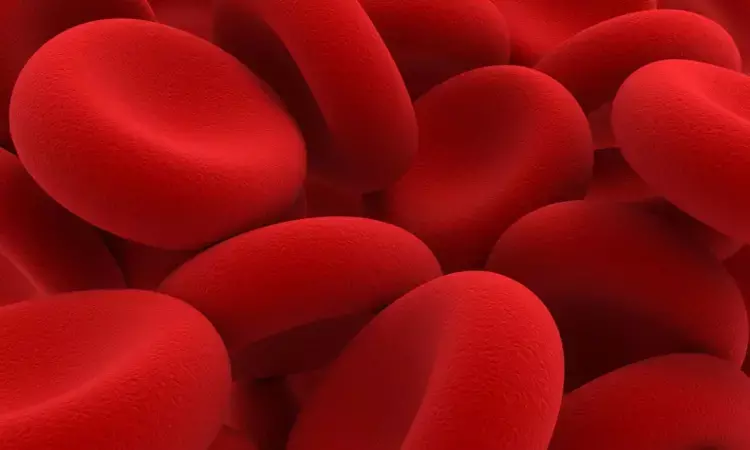- Home
- Medical news & Guidelines
- Anesthesiology
- Cardiology and CTVS
- Critical Care
- Dentistry
- Dermatology
- Diabetes and Endocrinology
- ENT
- Gastroenterology
- Medicine
- Nephrology
- Neurology
- Obstretics-Gynaecology
- Oncology
- Ophthalmology
- Orthopaedics
- Pediatrics-Neonatology
- Psychiatry
- Pulmonology
- Radiology
- Surgery
- Urology
- Laboratory Medicine
- Diet
- Nursing
- Paramedical
- Physiotherapy
- Health news
- Fact Check
- Bone Health Fact Check
- Brain Health Fact Check
- Cancer Related Fact Check
- Child Care Fact Check
- Dental and oral health fact check
- Diabetes and metabolic health fact check
- Diet and Nutrition Fact Check
- Eye and ENT Care Fact Check
- Fitness fact check
- Gut health fact check
- Heart health fact check
- Kidney health fact check
- Medical education fact check
- Men's health fact check
- Respiratory fact check
- Skin and hair care fact check
- Vaccine and Immunization fact check
- Women's health fact check
- AYUSH
- State News
- Andaman and Nicobar Islands
- Andhra Pradesh
- Arunachal Pradesh
- Assam
- Bihar
- Chandigarh
- Chattisgarh
- Dadra and Nagar Haveli
- Daman and Diu
- Delhi
- Goa
- Gujarat
- Haryana
- Himachal Pradesh
- Jammu & Kashmir
- Jharkhand
- Karnataka
- Kerala
- Ladakh
- Lakshadweep
- Madhya Pradesh
- Maharashtra
- Manipur
- Meghalaya
- Mizoram
- Nagaland
- Odisha
- Puducherry
- Punjab
- Rajasthan
- Sikkim
- Tamil Nadu
- Telangana
- Tripura
- Uttar Pradesh
- Uttrakhand
- West Bengal
- Medical Education
- Industry
Breakthrough Treatment with Mitapivat Mitigates Iron Overload in Rare Hereditary Anemia: Study

In a groundbreaking development, a recent study has unveiled promising results for the treatment of pyruvate kinase (PK) deficiency, a rare hereditary disease causing chronic hemolytic anemia. They found that Mitapivat is highlighted as the first disease-modifying pharmacotherapy to have beneficial effects on iron overload in patients with PK deficiency as stimulation of mutant PK enzyme (PKR) through mitapivat exhibited substantial and enduring enhancements in both iron homeostasis and overload over an extended period.
The study results were published in the journal Blood Advances.
Patients with PK deficiency often experience iron overload, a condition associated with severe complications such as liver cirrhosis, cardiomyopathy, arrhythmia, sudden cardiac death, and endocrine dysfunction. The study, which combines data from the ACTIVATE trial and its subsequent long-term extension (LTE) study, focuses on the efficacy of mitapivat, an oral allosteric activator of the red blood cell wildtype and mutant pyruvate kinase enzyme (PKR).
Mitapivat has gained approval from the US Food and Drug Administration for treating hemolytic anemia in adults with PK deficiency. The ACTIVATE trial employed a double-blind, placebo-controlled design, where patients with PK deficiency and not regularly receiving transfusions were randomly assigned to receive either mitapivat or a placebo. Those demonstrating clinical benefit from mitapivat or initially assigned to the placebo arm were eligible to continue in the LTE study. The LTE study included patients categorized into the mitapivat-to-mitapivat arm (M/M) or placebo-to-mitapivat arm (P/M). The ACTIVATE/LTE analysis tracked changes over 96 weeks in iron-related markers, including erythroferrone, soluble transferrin receptor, hepcidin, and liver iron concentration. Patients with baseline iron overload were assessed for liver iron concentration (LIC) changes.
Findings:
- Results from the combined analysis of both studies, involving 80 patients (M/M=40; P/M=40), underscore the profound impact of mitapivat on iron homeostasis and overload.
- Meaningful improvements were observed in markers related to iron regulation, including hepcidin, erythroferrone, soluble transferrin receptor (sTfR), and liver iron concentration (LIC).
- Notably, these improvements were sustained over an impressive period of up to 96 weeks of mitapivat treatment.
- The study revealed that patients in the M/M arm experienced early-on improvements within 24 weeks of starting mitapivat, whereas minimal changes were observed in the P/M arm during the placebo phase.
- Encouragingly, the P/M arm demonstrated similar improvements to the M/M arm after switching to mitapivat in the LTE.
- Furthermore, among patients treated with mitapivat, over half (55.1%) initially met the criteria for iron overload at baseline.
- These individuals exhibited clinically meaningful and continued improvements in iron overload over time, as evidenced by a significant decrease in LIC.
- This reduction in iron overload is a critical finding, as excessive iron accumulation can lead to serious and potentially life-threatening complications.
In conclusion, the activation of PKR with mitapivat emerges as a transformative therapeutic approach, showcasing meaningful and sustained improvements in iron homeostasis and overload in patients with PK deficiency. This breakthrough marks mitapivat as the first disease-modifying pharmacotherapy with proven efficacy against iron overload in individuals grappling with the challenges of PK deficiency. The results of this study hold significant promise for enhancing the overall quality of life for those affected by this rare genetic disorder.
Further reading: van Beers EJ, Al-Samkari H, Grace RF, et al. Mitapivat improves ineffective erythropoiesis and iron overload in adult patients with pyruvate kinase deficiency. Blood Adv. Published online February 8, 2024. doi:10.1182/bloodadvances.2023011743
BDS, MDS
Dr.Niharika Harsha B (BDS,MDS) completed her BDS from Govt Dental College, Hyderabad and MDS from Dr.NTR University of health sciences(Now Kaloji Rao University). She has 4 years of private dental practice and worked for 2 years as Consultant Oral Radiologist at a Dental Imaging Centre in Hyderabad. She worked as Research Assistant and scientific writer in the development of Oral Anti cancer screening device with her seniors. She has a deep intriguing wish in writing highly engaging, captivating and informative medical content for a wider audience. She can be contacted at editorial@medicaldialogues.in.
Dr Kamal Kant Kohli-MBBS, DTCD- a chest specialist with more than 30 years of practice and a flair for writing clinical articles, Dr Kamal Kant Kohli joined Medical Dialogues as a Chief Editor of Medical News. Besides writing articles, as an editor, he proofreads and verifies all the medical content published on Medical Dialogues including those coming from journals, studies,medical conferences,guidelines etc. Email: drkohli@medicaldialogues.in. Contact no. 011-43720751




